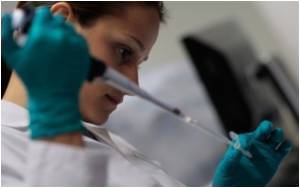
The work is reported in the October 1, 2010, issue of the journal Science.
Taxol (paclitaxel) and its structural analogs are among the most powerful and commercially successful anticancer drugs, used to treat Kaposi's sarcoma and breast, lung and ovarian tumors.
Taxol was originally derived from the bark of the Pacific yew tree. Its anti-cancer properties were discovered more than 40 years ago.
But Taxol's power comes with an environmental price: Early stage production methods required sacrificing two to four fully grown trees for each patient. Alternative means of production – such as using needles rather than bark – still rely on slow, laborious plant-based processes. This limits production of Taxol itself and development of new derivatives that might be even more effective.
"This was the basis for our efforts to redirect biosynthesis through a simple, process-friendly bacterium like E. coli," explains Tufts' Blaine Pfeifer, Ph.D., assistant professor of chemical and biological engineering and co-corresponding author on the paper. "We faced a tremendous challenge because of the engineering needed first to 'equip' the E. coli cell to support Taxol biosynthesis and the subsequent protein engineering required to allow the first two steps in the Taxol biosynthesis scheme to be active within this new host."
Advertisement
The researchers partitioned the taxadiene metabolic pathway into two modules: the intracellular supply of substrates, or precursors, that must be present within the E. coli cell before Taxol can be produced (the upstream pathway) and the biosynthetic steps needed to make the first two Taxol intermediates (the downstream pathway). This modular approach allowed manipulation of the many variables in each pathway to achieve the right balance to optimize production of the two intermediates. It effectively "unlocked" unprecedented production levels of early-stage Taxol intermediates through E. coli.
Advertisement
The researchers caution that significant work is still needed in order to complete the synthesis of a Taxol precursor suitable for commercial production and potentially replace the current plant-based production process with a more efficient operation based upon microbial biosynthesis. Such an approach could also be applied to production of chemicals and fuels microbially derived from renewable resources.
"Though this is only a first step, it is a very promising development and certainly supports this approach and its potential," said Pfeifer.
Source-Eurekalert










